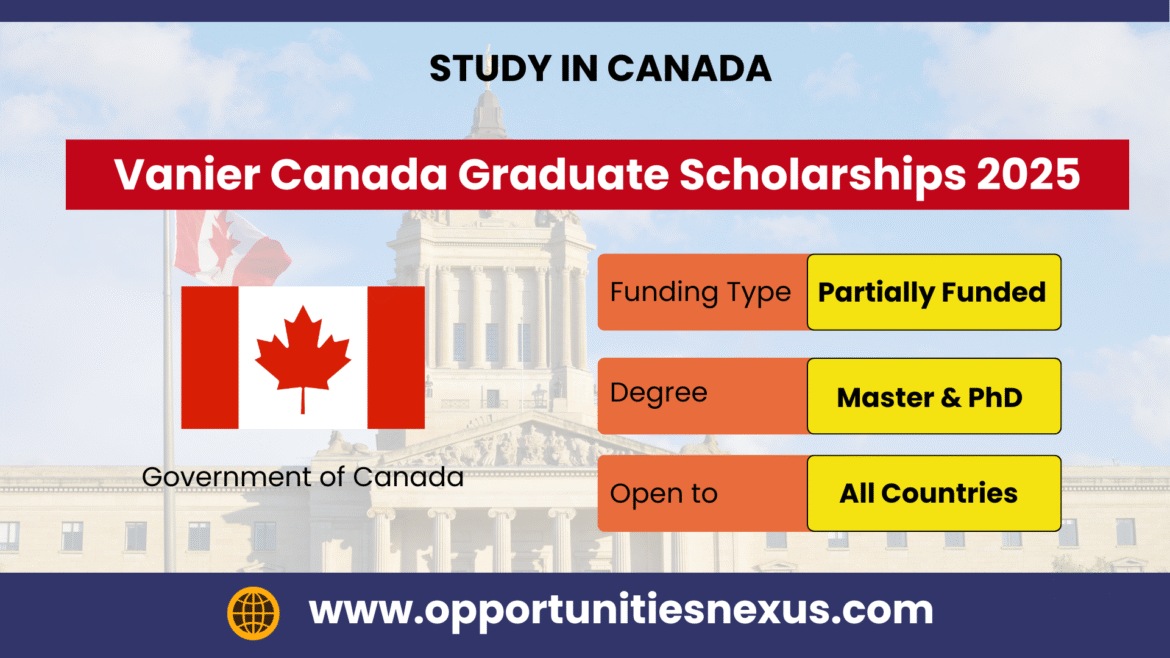Now, imagine that you were being paid $50,000 a year to conduct cutting-edge research in your field, with no teaching responsibilities—or strings. For the world’s elite PhD students, it’s not a fantasy. It’s the fact of the Vanier Canada Graduate Scholarships (Vanier CGS), among the highest of all Canadian academic awards.
Founded in 2008, and in honour of Canada’s first francophone Governor General Major-General Georges P. Vanier, the scholarship has enabled over 1,700 researchers in addressing issues of fundamental importance to decision-makers, companies and citizens. But with just 166 scholarships awarded each year, and acceptance rates of <5%, winning the scholarship takes more than brilliance—it takes planning.
In this guide, you will find back-tested tactics from former winners, a dissection of hidden eligibility traps and a step-by-step roadmap on how to have one of the strongest applications. Let’s dive in.
Program Details:
| Attribute | Details |
|---|---|
| Provider | Government of Canada |
| Degree Level | Doctoral (PhD or combined MA/PhD, MD/PhD, or JD/PhD programs) |
| Coverage | CAD $50,000 per year for three years |
| Eligible Nationalities | Canadian citizens, permanent residents, international students |
| Location | Recognized Canadian institutions |
| Number of Awards | Up to 166 annually |
| Official Website | Vanier CGS Website |
| Deadline | Internal deadlines vary; Final deadline: November 2024 |
Benefits:
1. Financial Stability
With CAD $50,000 annually for three years, recipients can focus entirely on their research without financial stress. This amount typically covers:
- Tuition and university fees
- Research and lab expenses
- Living and accommodation costs
2. Global Recognition
Being named a Vanier Scholar adds significant weight to your academic CV. It communicates to future employers, research institutions, and global bodies that you are among the best in your field.
3. Interdisciplinary Freedom
Vanier supports a wide range of research disciplines under three agencies:
- CIHR for health-related research
- NSERC for natural sciences and engineering
- SSHRC for social sciences and humanities
4. Leadership Development
Applicants must demonstrate leadership potential. As a result, Vanier fosters not just academics but thought leaders ready to influence communities and global change.
5. Networking and Collaboration
Being part of a cohort of high-achieving scholars across disciplines facilitates unique collaborations and lifelong professional connections.
Required Documents:
- ResearchNet Application Form: Filled and submitted via ResearchNet.
- Canadian Common CV (CCV): Detailing your academic background, publications, and work history.
- Leadership Statement (2 pages): A narrative showcasing your leadership experiences and vision.
- Research Proposal (2 pages): Including objectives, methods, expected outcomes, and relevance.
- References (5 pages): Supporting literature or prior studies that reinforce your proposal.
- Two Letters of Recommendation: From referees who can attest to your research potential and leadership.
- Transcripts: From all post-secondary institutions attended.
- Institutional Nomination Letter: From the Canadian institution where you intend to pursue your PhD.
Eligibility Criteria:
Nomination by a Canadian Institution
One-month Projects Based on a Nomination from a Canadian Institution
Candidates must be nominated by a Canadian university with a Vanier CGS quota.Admittance into a Doctoral Course
Award recipients must be enrolled in the first sterling doctoral program of their choice (PhD; or joint first program such as the MD/PhD, MA/ PhD, JD/ PhD).Full-Time Enrollment
Nominees must have the intention of pursuing on-site, full-time doctoral studies and research at the nominating institution.Academic Excellence
Must have a first class average (as determined by the school) in the last two full-time years of study.Leadership Potential
Leadership ability, community service, or other accomplishments outside the classroom.Citizenship
For Canadian citizens, permanent residents, and international students.Timing of Studies
Applicants cannot have spent more than 20 months in a doctoral program by May 1, 2025.
How to Apply:
Step 1: Confirm Your Eligibility
Review all eligibility criteria on the official website and select a Canadian university that has a Vanier CGS quota.
Step 2: Secure a Nomination
Contact the graduate studies office of your chosen university to express interest and request nomination.
Step 3: Prepare Documents
Start assembling your ResearchNet profile, write your research proposal and leadership statement, and reach out to your referees.
Step 4: Submit Application
Complete the application on ResearchNet and submit it before your institution’s internal deadline.
Step 5: Institutional Review
Your institution reviews your application. If nominated, your materials are sent to the Vanier Secretariat.
Step 6: Await Results
Final results are announced by April 2025. Scholarships begin in May or September 2025, depending on the program start date.
Deadline:
University Internal Deadlines: Usually August to October 2024, vary by institution.
Vanier Program Final Submission: November 2024
Results Release: April 2025
Insights and Application Tips from Former Applicants
1. Start Early
Former applicants recommend beginning the application at least six months in advance. This gives you ample time to refine your proposal and leadership statement.
2. Tailor Your Leadership Statement
Avoid vague descriptions. Provide quantifiable achievements and emphasize real-world impact. Use active voice and highlight community involvement or mentorship.
3. Match Your Research with the Institution
Choose a university where your proposed research aligns with existing faculty expertise. A strong institutional letter of nomination can be a game-changer.
4. Make it Collaborative
Get your supervisor and referees involved early. Share your documents with them, ask for feedback, and align their recommendation letters with your narrative.
5. Review Successful Applications
If possible, review past successful applications (some are available via university graduate offices). They provide insights into tone, structure, and expectations.
6. Follow Formatting Guidelines Strictly
Vanier applications are very strict on page limits and formatting. Ignoring them may disqualify your application.

